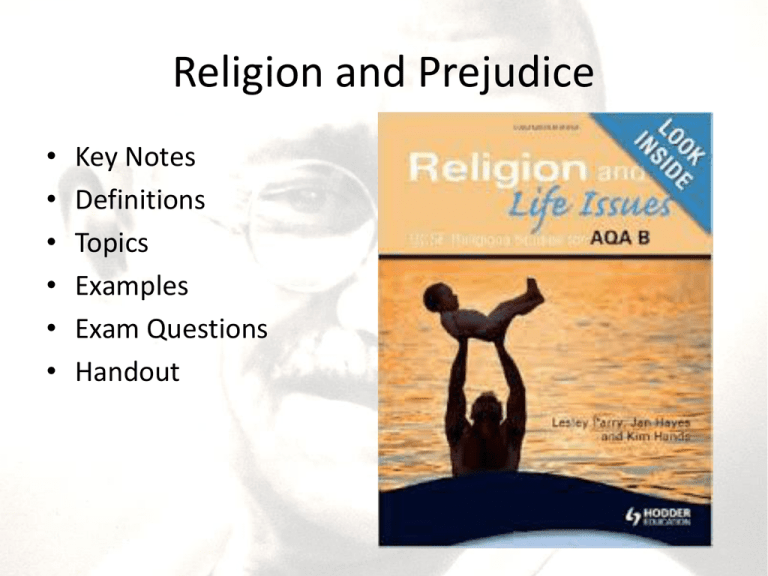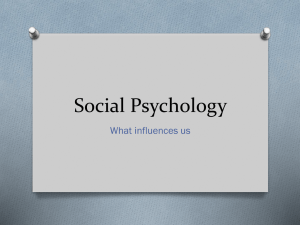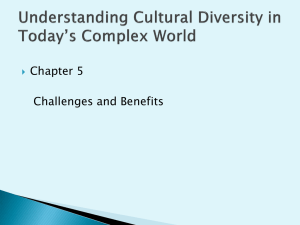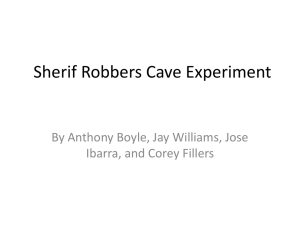
Religion and Prejudice
•
•
•
•
•
•
Key Notes
Definitions
Topics
Examples
Exam Questions
Handout
Religion and Prejudice
Specification 2014:
Within this topic candidates should be familiar with the key teachings
from the religion(s) studied and should be aware of how religious
leaders and other faith members have interpreted these teachings and
applied them to life in society today.
1 types of prejudice, including religion, race, colour, gender, age,
disability, class, lifestyle, looks;
2 the causes and origins of prejudice, including ignorance,
stereotyping, scapegoating, influence of parents or media, victims of
prejudice experience;
Specification
3 concepts of tolerance, justice, harmony and the value of the
individual
4 religious attitudes to prejudice and discrimination;
5 effects of prejudice and discrimination (including the idea of positive
discrimination);
6 religious responses to prejudice and discrimination by individuals,
groups, society and the law;
7 religious believers who have fought against prejudice, e.g. Mahatma
Gandhi, Martin Luther King, Desmond Tutu.
Keywords
• 1 – Prejudice – pre-judgement without
sufficient reason. Usually negative
• 2 – Discrimination – Acting on prejudice
• 3 – Positive Discrimination – Treat someone
more favourably because of race, sex etc.
Keywords
• 4 – Stereotyping – Prejudice/belief that a
group of people share similar characteristics
• 5 – Patriotism – Severe form is belief that
people from your country are superior
• 6 – Equality – All humans have the same value
and worth and deserve the same rights and
opportunities
• 7 – Tolerance – Open-minded and accept and
respect other people despite differences
Keywords
• 8 – Justice – Everything being fair and equal
• 9 – Harmony – to live peacefully in a
community (group who live together or share
a defining belief)
• 10 – Value of the Individual – All people are
important and of worth
• Sample Exam Question – Using examples
explain the difference between prejudice and
discrimination? (3 marks)
Types of Discrimination
• Types of Prejudice:
• Prejudice and
discrimination can exist in
many ways. It can be
through excluding
someone from a group or
activity, an attitude within
an organisation or
institution, employment,
use of offensive language,
general social attitude
towards somebody.
Types of Discrimination
• 4 – Types of Discrimination – racism (slavery),
sexism (no female priests), ageism (employing
elderly), religious discrimination
(islamophobia), disability discrimination
(poor access), discrimination based on
lifestyle or looks including homophobia (gay
marriage) – Can you think of any other
examples?
Types - Ageism
• Can apply to anyone of any age group. It is only seen as
discrimination if there is not a good reason. For
example, young people not getting the vote or the
elderly driving limits are not seen as discriminatory.
• Ageism at work is covered by the ‘Age Discrimination
Act 2007’, which forbids discrimination of employment
based on grounds of age.
• For example, you cannot deny someone a job because
their age profile does not fit in with your company
image.
Types - Sexism
• Some are still many examples of discrimination based on
gender in society. Certain stereotypes are still held and
certain jobs are seen as gender specific, despite any link
between gender and ability to do the job.
• Another arguable example is the still existent pay gap
between men and women in work.
• Certain religions are seen as being sexist. Some people feel
that having different roles does not mean they are not
viewed equally.
• Some examples are; women priest are not allowed in the
Roman Catholic Church, Imams must be male, women sit
separately to men in Orthodox Judaism, women are not
allowed to drive in Saudi Arabia on religious grounds.
Types – Disability
• The Paralympics have done a lot to combat
disability prejudice in recent years. Disability
discrimination can be based on mental or
physical disabilities. These may include
negative attitudes or stereotypical portrayals
in TV and film.
Types – Looks and Lifestyle
• Based on how people look or how they choose to live.
• In 2007 Sophie Lancaster was killed for being dressed as a
‘goth’. Attitudes based on appearance are impacted by first
impressions and certain stereotypical views are often
formed.
• Lifestyle includes homophobia, with current issues
including the legalisation of gay marriage. Some religions
would argue that this is not prejudice as their sufficient
reason is belief and scriptural teaching. Most religions that
are against homosexuality are against homosexual acts
rather than homosexual people. Homophobic language is
still something that often isn’t treated as seriously as it
should be.
Questions
• Should certain
employers be allowed to
pick people who look a
certain way?
Religious Discrimination
• Based on religious belief.
• Not so common in the UK as we are very
multicultural compared to most countries.
Examples in the modern day often revolve
around appearance.
• This can be seen with the Sikh turbans and five ks
and Muslim attire including the niqab or burka.
• There are also some negative views of Islam in
the media and in political groups such as the EDL.
This is called Islamophobia.
Question
• Should the burka be
banned?
• Info – Hijab – Head
Scarf
• Niqab – Head veil
• Burka – Full head veil
and body covering
Types - Racism
• Based on ethnicity.
• Can include attitudes, language or not
including individuals because of ethnicity.
• Historical examples include the holocaust and
black slavery and modern examples can be
seen in racism in football and attitudes toward
Eastern Europeans entering the UK in recent
years.
Types - Positive Discrimination
• This is widely viewed as on the rise in the last few
years due to a greater awareness of prejudice.
• An example is, with some jobs, you are
guaranteed an interview if you fit certain criteria
of a minority such as having a disability (GIS).
• Some people feel this is a positive step on the
road to full equality and combatting prejudice in
society but others feel that the majority can now
become a victim of discrimination themselves.
Question
• Is positive
discrimination a good
thing?
• Sample Exam Questions – 1 – Explain religious
attitudes towards the role of women. (5
marks)
• ‘Positive Discrimination is a good thing.’ What
do you think? Explain your opinion. (3 marks)
2 - Causes of Prejudice and
Discrimination
• What are the origins or
causes of prejudice and
discrimination?
• Can you think of any
reasons why prejudice
exists? Brainstorm
• NOTE – A popular exam
question
Ignorance
• Ignorance – Lack of
education or
understanding about a
culture or lifestyle leads
to intolerant
assumptions forming
without any real
thought or evidence eg
rastafarians are
‘druggies’
Stereotyping
• Attributing blame to a
certain group with shared
characteristic eg Eastern
Europeans are coming here
just to claim benefits.
Stereotyping stems from
evolutionary need to
categorise things so we can
react quickly. If we get
bitten by a snake once, we
then naturally stereotype all
snakes as dangerous. We
can use are reason to
overcome this.
Scapegoating
• Similar to stereotyping
but it is blaming a group
for a problem. May be
caused by tension in a
local community
combined with
ignorance.
Upbringing
• Again evolutionarily
necessary to follow
your parents and adopt
their views in early
childhood. Thus
prejudiced attitudes can
be passed on. Education
can break this cycle.
Media
• Stereotypes of groups
shown on TV/film or
through bias reporting
in the media. For
example, saying ‘The
British man was
attacked by the Muslim’
suggests the latter is
not the same as the
former.
Bad Experience
• Having a negative
experience with one
person can lead to
prejudice against other
members of that
culture etc.
Patriotism
• ‘Blurring the lines’
between being proud to
be a certain nationality
and acting negatively
towards people not
perceived as being part
of this. Xenophobia is
seeing those outside of
this in a negative light.
• All of this can relate back to fear.
• Sample Exam Questions – ‘You need to change
the way people think to prevent
discrimination.’ What do you think? Explain
your opinion. (3 marks)
• ‘Ignorance is the greatest cause of prejudice.’
(6 marker)
5 - Effects of Discrimination
• What impact do you think different types of
prejudice and discrimination can have?
Consider individuals, groups, communities
(local national and international).
Effects of Discrimination
• Feeling afraid or
excluded.
• Verbal or physical
violence.
• Bullying at school.
• Depression, anxiety.
• Segregation of
communities.
• Rise in political parties
based on prejudice eg
EDL/BNP. Increased
international political
relationships.
Employment and
earning potential.
6 - Discrimination and the Law
• Should an individual be
allowed to say what
they want if it is not
directly to someone
(deny the holocaust)?
Where is the line
between right to free
speech and right to not
be offended?
Laws
• Attitudes and views cannot be policed but
discrimination (acting on them) can be dealt with by
law.
• 1976 Race Relations Act – Illegal to discriminate based
on race or nationality. Part of this is now promoting
harmony and tolerance through actions in public
sector.
• 1975 – Equal Pay Act – men and women. Remember,
through suffragettes, women only got the vote in 1918.
• 1995 – Disability Discrimination Act; 2007 Sexual
Orientation Regulation; 2014 legalisation of gay
marriage.
Question
• Reflection – Men and women tennis players
should get equal pay at Wimbledon…
4 - Responding to and Combatting
Prejudice:
• Religions and society can
do a lot to combat
prejudice and
discrimination, it does not
all need to be left to the
law. It can be about
• 1) Helping victims of
prejudice and
discrimination
• 2) Combat attitudes in
society
• 3) Promoting the rights of
a certain group.
Society
• Society – Promoting respect, tolerance and
understanding in schools in a variety of
subjects helps to combat embedded
ignorance.
• Can include; RE/Citizenship/History. Allowing
schools where all students can mix together
causes barriers of fear to be broken down.
Workplaces and schools having a zero
tolerance policy to matters of discrimination.
Religion
• Religion – School assemblies or classes to help
inform people about their religious beliefs.
• Listening or providing support to victims
through outreach work. Pray or offer spiritual
guidance.
Organisations Tackling Discrimination:
• To be able to talk about groups or charities
that work to tackle discrimination is
important, especially explaining practical and
current campaigns.
Organisations Tackling Discrimination:
• FARE – Football Against
Racism in Europe.
Involves campaigns that
are aiming to change
attitudes and actions in
football and include the
‘kickitout’ campaign
and the ‘show racism
the red card’ campaign.
Organisations Tackling Discrimination:
• Age Concern –
(formerly help the
aged). Biggest charity
working with and for
older people and
providing local and
national campaigns to
influence public
attitudes and to provide
practical support for the
elderly.
• Sample Exam Questions –
• Explain the different ways that victims or
prejudice can be helped. (5 marks).
• ‘The greatest responsibility for combatting
prejudice and discrimination is with schools.’
(6 marker)
4 - Religious Responses to Racism and
Prejudice:
• Buddhism – Discrimination leads to suffering. Two of
the three poisons of life are ignorance and hatred.
Compassion (karuna) and kindness (metta) lie at the
heart of Buddhism.
• The Dalai Lama is an advocate and example of equality
and peace. The speak or act unkindly to someone
would not be following the noble eightfold path in
either right speech or right action.
• Finally, Buddhist monks and nuns all dress the same
and are all equal. There is no exclusion from who can
reach enlightenment.
4 - Religious Responses to Racism and
Prejudice:
• Christianity – St. Paul said in the New Testament “There is
neither Jew nor Gentile (non-Jew), slave or free man, male
or female. We are all equal in Christ.”
• Equality and love are major parts of the teaching of Jesus.
Jesus’ Golden Rule is treat others as you would like to be
treated, which would guard against discrimination.
• Many of his teachings focus on not pre-judging but
accepting somebody regardless of who they are.
• The parable of the Good Samaritan teaches the importance
of helping everyone equally and how stereotypes are
unjustified. Jesus said ‘Love your neighbour as yourself.’
4 - Religious Responses to Racism and
Prejudice:
• Islam – In Islam there is a yearly pilgrimage
called Hajj (a pillar of Islam). When Malcolm X
famously became a Muslim, he said that,
whilst on Hajj, he saw true equality for the
first time. Gender, skin colour, age, lifestyle
were all irrelevant as al were equal in the eyes
of Allah.
4 - Religious Responses to Racism and
Prejudice:
• Contrarily – You can argue that certain teachings in many
religions do not help combat prejudice. For example, many
Christians, based on Leviticus and the letters of St. Paul, see
homosexuality as immoral. Although, many Christians
would say that it is the sin and not the sinner who should
be judged. Also, it can be seen in Genesis that Eve was
made from Adam and that she was the one who was
tempted by the snake. God also chooses the Israelites as
‘His’ people.
• Of course, this all depends on interpretation. In many
Muslim countries where the law is Shari’ah or Islamic,
homosexuality is illegal. Also, women are often banned
from driving or must wear certain clothing to cover
themselves.
4 - Religious Responses to Racism and
Prejudice:
• Buddhism and Christianity on Ageism –
specifically on ageism, we can use the quotes:Buddhist ‘You may carry your mother on one
shoulder and your father on the other for a
hundred years and still be in debt to them,’
Christian ‘Honour your mother and father.’
• Sample Exam Questions –
• ‘Women priests should be allowed.’ (6 marker)
• Explain religious attitudes towards
homosexuality. (5 marks)
7 - Fighters against Prejudice:
• You need to be able to talk in detail about the
work of one individual who helped combat
prejudice. Some points for three individuals
are given below. You need to add some more
depth in revision to these.
Martin Luther King Jr.
• Fought for black rights and the
ending of black segregation
and discrimination in the USA
in the 1960s. He was also a
Christian pastor. Made the
famous ‘I have a dream…’
speech outlining how
character and not skin colour,
were what people should be
judged by. He was murdered in
1968 but his impact could be
argued to still be relevant
today with Barack Obama as
the first black US president.
Gandhi
• Indian lawyer who grew up
a Hindu and moved to
South Africa. He fought for
equal rights for the Indian
minority there. In India, he
peacefully protested
(ahimsa), against British rule
and for an end to the caste
system. He famously called
the ‘untouchables’ or
lowest in society harijan or
children of God.
Archbishop Desmond Tutu
• Christian fighting for
racial equality in South
Africa. Opposed the
racist Apartheid regime.
Won the Nobel Peace
Prize in 1984. Main
argument is that we are
all made in the image of
God. Still campaigns
internationally for
equality today.
• Sample Exam Question – Explain the work of
one religious leader in fighting prejudice. (5
marks)
3 - Promoting a peaceful and harmony
in Society:
• Some other points to consider in terms of living in
a peaceful and harmonious society…
• How does immigration impact prejudice?
• Should faith schools be allowed?
• Should hateful speech be a crime?
• To what extent has the internet made prejudice
and discrimination worse?
• Do we live in a more or less equal society today?
• Are there any stereotypes that are still widely
held and potentially unfair?
Sample Exam Paper
• 1 – Explain briefly the difference between prejudice
and discrimination. (2 marks)
• 2 – Explain how religious believers have fought against
racism. Use examples in your answer. (4 marks)
• 3 – ‘Being prejudiced insults God.’ What do you think?
Explain your opinion. (3 marks)
• 4 – Explain some attitudes towards homosexuality in
religion. (3 marks)
• 5 – ‘Only laws can stop discrimination.’ Do you agree?
Give reasons for your answer, showing how you have
thought about more than one point of view. Refer to
religious arguments in your answer. (6 marks)







